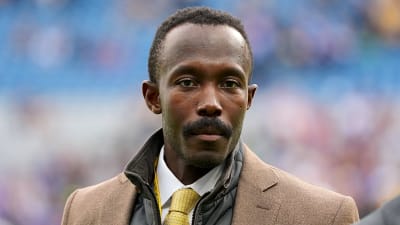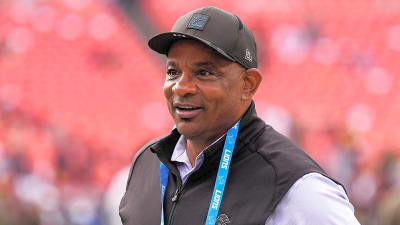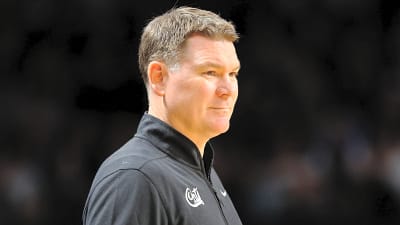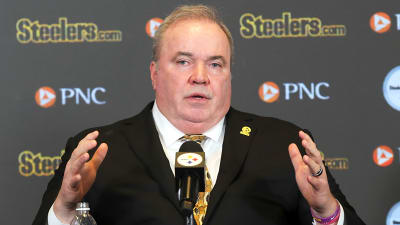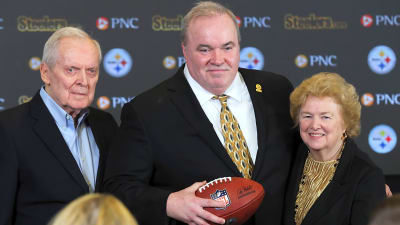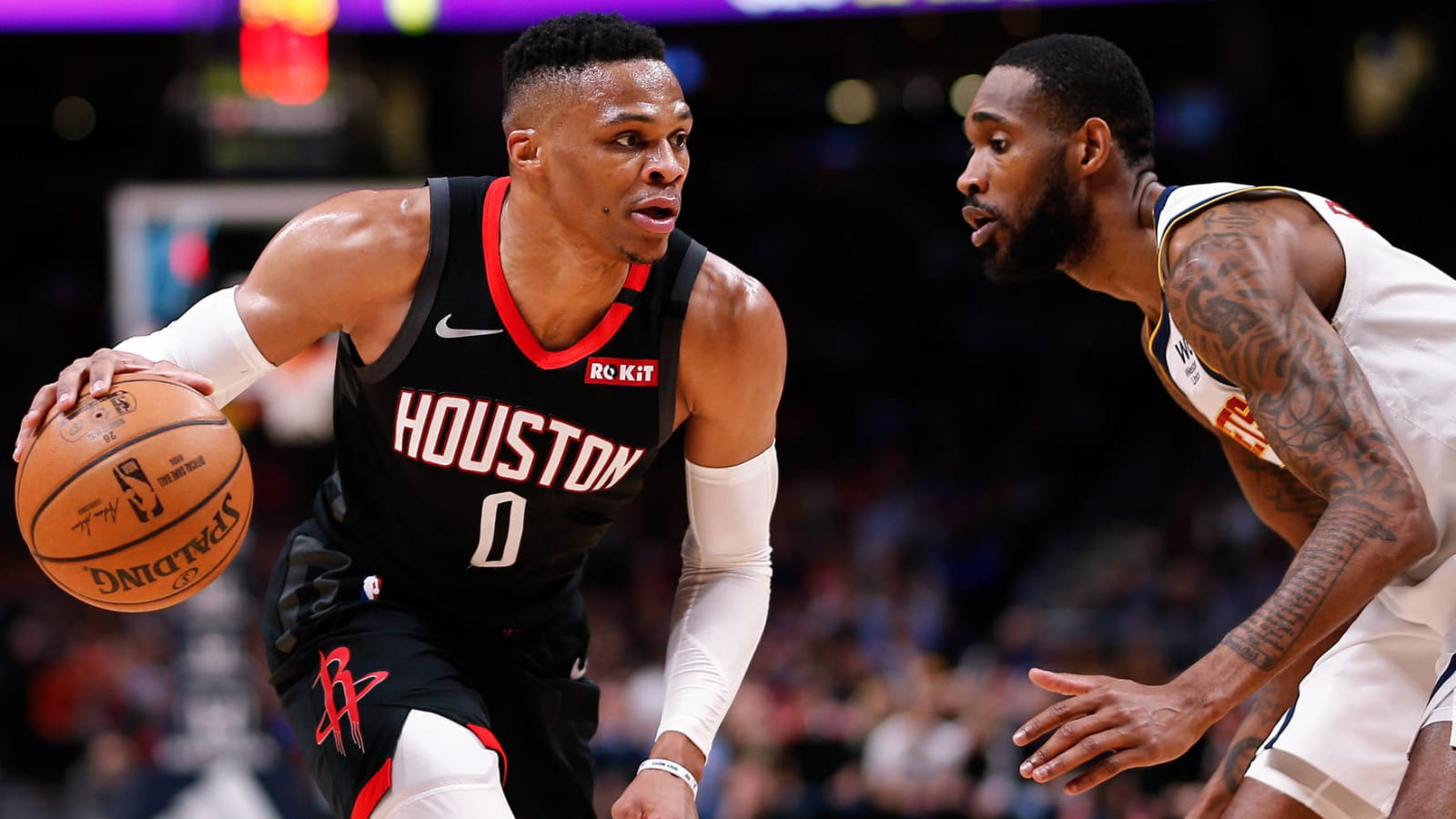
Until playoffs, Rockets should be commanded by 'Captain' Westbrook
There’s a memorable scene in the movie Captain Phillips where the pirates take over the ship, and Muse, the lead pirate, calmly tells Captain Phillips (Tom Hanks), “Look at me. Look at me. I’m the captain now.” It’s a simple yet powerful line, and you immediately understand that Muse is not only in complete control of the situation, but that he, not Captain Phillips, will be the star of the movie from that point. Like some great villains, he’s so captivating that you find yourself almost rooting for him by the end of the movie.
Russell Westbrook is the Muse of the 2019-20 Houston Rockets (29-18), who are tied with the Mavericks -- Friday's opponent -- for fifth in the Western Conference. And Russ' rise in the team hierarchy might be exactly what superstar James Harden and the Rockets need now. But The Beard, like Captain Phillips, must get the upper hand at the end.
Captain Harden
The first 25 games of this season mirrored last season in that the Rockets were, without question, Harden’s team. He averaged an insane 39.3 points, 7.5 assists, 5.9 rebounds, 24.7 field goal attempts, 14.0 three-point attempts and 13.6 free throw attempts per game. During that same stretch, Westbrook averaged 22.5 points, 7.3 assists, 8.0 rebounds, 19.7 field goal attempts, 5.0 three-point attempts and 6.0 free throw attempts. There was a clear pecking order in the first quarter of the Rockets’ season -- Harden was the first and second option, and Westbrook was the inefficient third option.
But then something changed …
Actually, a couple of things changed. First, opponents got sick of routinely getting embarrassed by Harden, so they blitzed pick-and-rolls, forcing him to give up the ball, and sometimes double-teamed The Beard as soon as he crossed half court. Harden was so unstoppable that teams resorted to gimmick defenses typically not used after high school basketball.
Major concern or blip? Dissecting James Harden's slump
To counter, Harden often found Westbrook, giving him an opportunity to attack four-on-three. Over Harden’s next 19 games, his per-game averages in points (30.9), field goal attempts (22.1), three-point attempts (11.5) and free throw attempts (10.3) fell compared to the first 25 games. Meanwhile, Westbrook increased his points to 31.5 (+9.0), field goal attempts to 25.4 (+5.7), and free throw attempts to 7.4 (+1.4) per game.
The second thing that changed was that Harden got banged up, missing three games and looking limited in others, and fell into a slump. Because of his thigh injury or simply wear and tear, Harden has been off in Houston’s past 22 games (42-34-83 shooting splits). His shooting splits were 45-36-88 for the first 25 games of the season.
The third change, and the most important for the Rockets, was that Westbrook became more efficient, improving his shooting splits from 43-23-76 over the team’s first 25 games to 49-24-82 over the team’s past 22. His six percent improvement on field goals and free throws is impressive. And while his three-point percentage is still horrific, he’s shooting significantly fewer threes per game than he did earlier this season. In fact, over his past six games, he’s only attempted five.
Westbrook has removed the largest wart in his game, but he's attacking the basket with the same reckless fervor that we saw earlier in his career. Although he’s not the same athlete he was his mid-20s, Westbrook is still one of the best athletes in the league. He's even developed into a craftier finisher in the lane. Russ' newest shot is a mini-Dirk, one-legged fadeaway that allows him to get into the paint, keep the defender at bay, and take an easy 5-10-footer.
Dive a little deeper into Westbrook’s shooting efficiency and shot selection, and you’ll see that Harden’s presence and Houston’s spread-out offense have helped him become a better shooter everywhere except at the rim and three-point line. Compared to last season, Westbrook's shooting percentage at the rim has dipped from 64 percent to 61 percent (attributable to his declining athleticism). But his numbers are up in these categories compared to 2018-19:
+ Between three feet and 10 feet from the basket: 23 to 39 percent
+ 10 to 16 feet: 32 to 40 percent.
+ 16 feet to the three-point line: 35 to 42 percent.
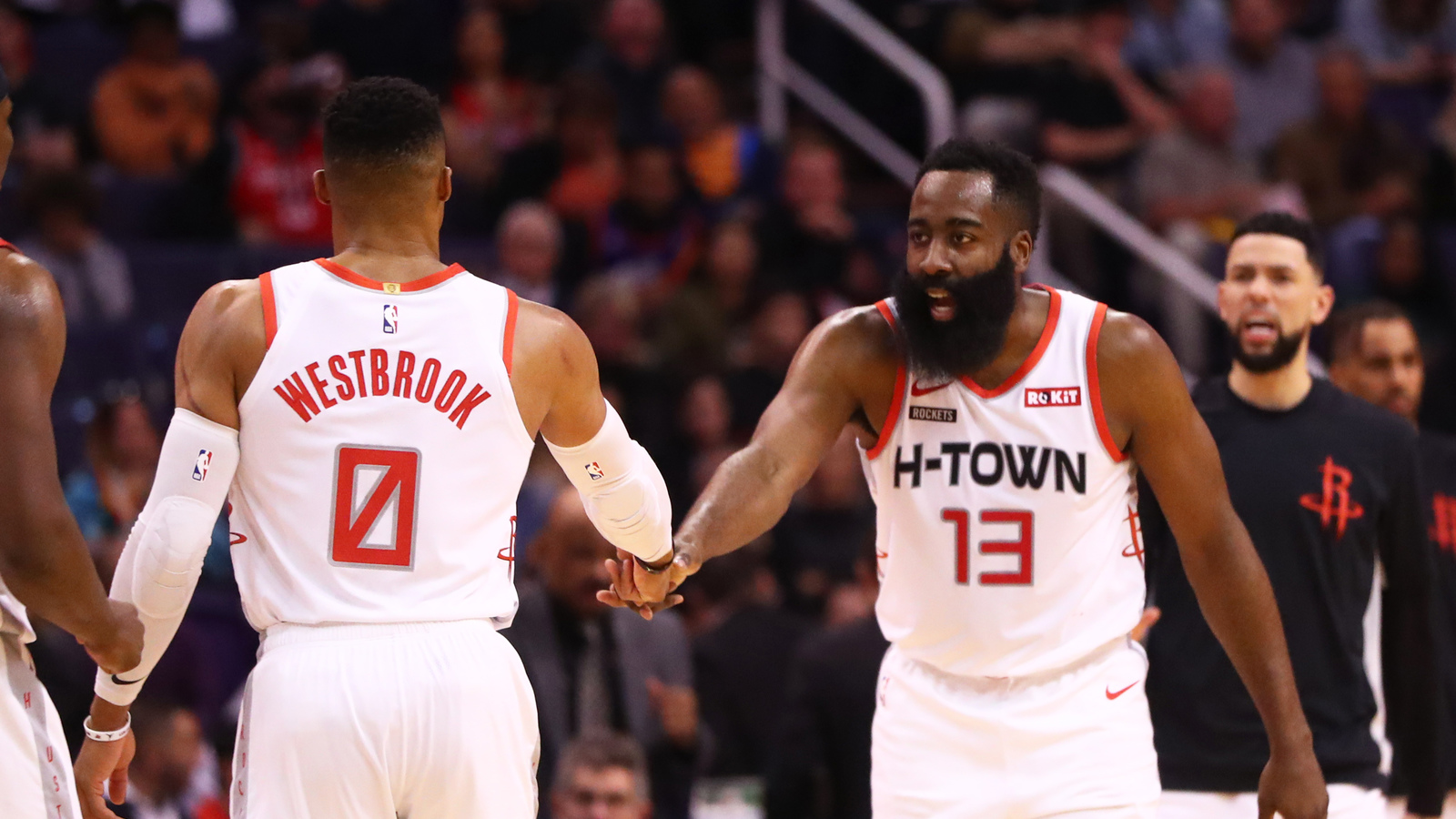
Captain Westbrook
The result of these changes is that Westbrook is the captain of the Rockets’ ship now. It may not be permanent, especially if Harden breaks out of his slump, but he's The Guy. It’s even showing in the players' usage ratings (the percentage of team plays used by a player while he was on the floor). Harden led the league the past two seasons in usage percentage and is a close third (37.0) this season, behind Dallas' Luka Doncic (37.2) and Milwaukee's Giannis Antetokounmpo (37.8). However, check out the month-to-month usage percentages for Harden and Westbrook this season:
USAGE BY MONTH
HARDEN WESTBROOK
October: 38.2 25.3
November: 38.4 32.3
December: 35.1 32.6
January: 34.3 34.8
Westbrook has steadily gained on Harden as the Rockets are becoming more reliant on him. Now check out the past 11 games:
Last 11: 32.2 35.0
Not sure if anyone saw this coming a couple of months ago when Harden was threatening to average 40 points a game.
Did Rockets accidentally stumble on right regular-season formula?
Since Harden arrived in Houston in 2012, the Rockets have failed to find the perfect balance between letting Harden cook in the regular season and keeping his legs ready for a long playoff run. In most seasons, the Rockets seemed more interested in getting Harden the MVP trophy than in keeping him fresh for the postseason. The Rockets have over-relied on him during regular-season games, often keeping him in during blowouts to accumulate more obscene statistics. But now that Houston has a second star in Westbrook, who plays at full throttle every minute of every game, perhaps it should let Harden take it easy during the doldrums of the 82-game season and then ramp back up for the playoffs.
It’s a bold strategy considering Harden is unequivocally better than Westbrook -– the Rockets were 17-8 through the first 25 games with Harden at the helm and only 12-10 (10-7 when Westbrook plays) with Westbrook taking the reins. It will lead to fewer regular-season wins and a worse seed in the playoffs. But Westbrook is still good enough to lead Houston to a No. 4, 5, or 6 seed, and keeping Harden fresh through the middle of the season just might lead to the Rockets peaking in May or June, the perfect time on the NBA calendar.
Will Russ turn team back to Harden?
Westbrook is perfectly capable of taking a backseat to a superstar teammate when it’s obvious to him that the superstar is playing at a higher level than he is. We saw him defer to Kevin Durant for most of their tenure together in OKC. We saw him defer to Paul George for most of last season in OKC, until it became clear that George’s shoulders were badly injured. We saw him defer to Harden during the first 25 games of this season. That’s never been the problem.
The problem is Russ’ definition of “obvious.” In his mind, his superstar teammate must play at an MVP level for it to be “obvious” to him that it’s in his best interest to defer to that teammate. Otherwise, Westbrook sees himself as the team’s No, 1 option. And once Westbrook thinks of himself as the go-to guy, he plays so hard that it’s damn near impossible to get him to relent and revert to his deferential ways. It’s this Mamba Mentality that has helped make Westbrook so great, but it’s also the reason his most talented teammates left the Thunder.
Will this happen again in Houston? Or are Russ and Harden playing the long game? Either way, because it’s Russ, it’ll be a captivating movie the rest of the way.
More must-reads:
- Damian Lillard downplays feud with Russell Westbrook in Instagram post
- Daryl Morey’s Hong Kong tweet cost NBA $150M-$200M in revenue
- The 'Youngest Conference Champ QBs' quiz
Breaking News
Trending News
Customize Your Newsletter
 +
+
Get the latest news and rumors, customized to your favorite sports and teams. Emailed daily. Always free!
